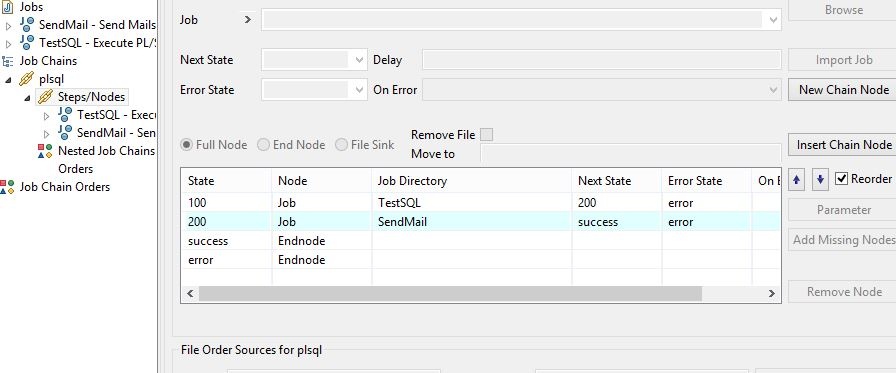| Table of Contents | ||||||||||
|---|---|---|---|---|---|---|---|---|---|---|
|
This article describes how to launch an Oracle™ RDBMS stored procedure using the JobSchedulerPLSQLJob JITL Job. This job is used as a standalone solution or triggered by orders to execute pl/sql statements in a database.
These can be database stored procedures or SQL statements as well.
The example also shows, how to send the result (output) of an pl/sql job as an email.
The documentation of the job JobSchedulerPLSQLJob can be found description JobSchedulerManagedDatabaseJob.xml is stored in the ./jobs directory of your Job Scheduler the JobScheduler installation.
The SQL instructions commands are written in defined using the command parameter.
It is possible to define more than one instruction in command as value of the command parameter.
Such instructions commands are then carried out in the order in which they are written and must be separated by a semicolon and a subsequent new line.
You can have to use the character sequence as for a newline.
Sample Example of a stored procedure:
| Code Block |
|---|
CREATE OR REPLACE PROCEDURE myTestProc IS vCounter NUMBER := 0; BEGIN select count(*) into vCounter from SCHEDULER_HISTORY; if vCounter>0 then dbms_output.put_line ('Set plsql_result IS The value of variable "vCounter" is: ['||vCounter||']'); end if; END; |
Please note that the output begins with "Set plsql_result". This will create an order parameter which can be used for example in the body of an email.
The example defines a job chain with two steps. First step is executing the pl/sql job and the second step is sending an email.
The following is an example of a job in which the command contains one statement.
...
The xml configuration of the pl/sql job
| Code Block | ||
|---|---|---|
| ||
<job title="Execute PL/SQL procedure" order="noyes" name="TestSQL"> <params > <param name="command" value="begin myTestProc; end;"/> <param name="db_url" value="jdbc:oracle:thin:@ur-lAsss:1521:XE"/> <param name="db_user" value="scheduler"/> <param name="db_password" value="scheduler`getDBPassword`"/> </params> <script language="java" java_class="sos.scheduler.db.JobSchedulerPLSQLJobJSAdapterClass"/> </job> |
Running this job will produce output in the log
| Code Block |
|---|
2013-04-03 10:29:21.477 [info] Set plsql_result IS The value of variable "vCounter" is: [5495] |
The SendEmail job comes from the JITL library.
| Code Block | ||
|---|---|---|
| ||
<job title="Send Mails" order="yes" stop_on_error="no" name="SendMail"> <description > <include file="jobs/JobSchedulerManagedMailJob.xml"/> </description> <params > <param name="to" value="info@sos-berlin.com"/> <param name="subject" value="Result from oracle"/> <param name="host" value="smtp_host"/> </params> <script language="java" java_class="sos.scheduler.managed.JobSchedulerManagedMailJob"/> <monitor name="configuration_monitor" ordering="0"> <script java_class="sos.scheduler.managed.configuration.ConfigurationOrderMonitor" language="java"/> </monitor> <run_time /> </job> |
These jobs will be chained in a job chain:
The second step of the job chain defines a node parameter for the body (the other parameters like subject, smtp-server are defined as job parameters).
When the second step is executed an email will be sent.
See also:
If you want to run SQL*Plus™ scripts, you can use the SqlPlus-Job: SOSSQLPlusJob
If you are not using Oracle™ RDBMS and/or you want to execute just a (simple) {{sql== command, please see the JobSchedulerManagedDatabaseJobSOSHibernate job.



